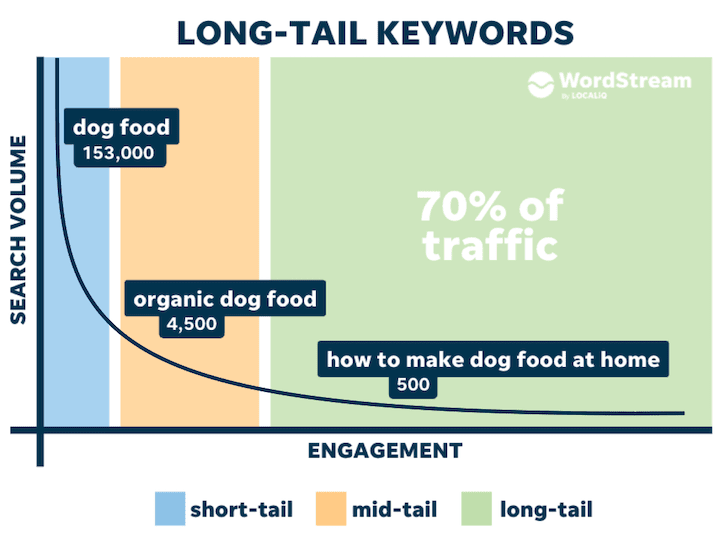Low Search Volume Keywords Have Value
Category: Search Engine Optimization | Tags: Content Strategy, avalanche email, business ideas, seo analogy
Learn More and Subscribe to The Avalanche Weekly Email
Today I’m talking about keywords with (seemingly) no search volume and why you should go after them.
Most of the time when I have conversations with people about keywords they are focused on short-tail keywords.
Short-tail keywords are attractive for their search volume, but most of them lack clarity and have a lot of ambiguity.
Most companies have no business ranking for short-tail keywords because they can’t fulfill the majority of the intentions behind those searching.
Take a look at this graphic, for example:

According to WordStream, the majority of search engine traffic to websites actually comes from long-tail keywords.
And while you can do keyword research to collect keywords and eventually generate good content to fulfill the long-tail intentions, your keyword research is always based on past search history, not the present or the future.
Between 16% and 20% of all annual Google searches are new.
You can’t do research on keywords that people haven’t searched for.
And the data often won’t show you keywords with low volume (generally less than 10 searchers per month).
But, there are often hundreds or thousands of those keywords within any given topic that seem like they aren’t being searched for.
So while you won’t find evidence of “how to make dog food at home for a shitzu,” if you believe that there are indeed shitzu owners that could want to make dog food at home, then make sure to help them with content designed for them.
Share this article:
The Avalanche Email: Fun. Simple. Educational. No Selling.
Learn Result-focused SEO & Content
Join over 2,272+ others who get one email every Wednesday with simple instructions on how to get more website traffic and leads through SEO and content marketing. (Learn more about the email)
Keep Learning
How To Show Up in Gemini (And Win More Local Jobs)
Show up in Gemini when homeowners search for landscaping services. Build the right signals on Google and your website to win more qualified local jobs.
How to Run Google Ads for Landscapers: A Complete Guide
Learn how to set up Google Ads for landscapers, attract qualified leads, and win more local jobs with this step-by-step guide.
🏔️ Watering > Planting New Seeds
Your next marketing win may already be on your site. Learn how to optimize existing pages for better rankings, traffic, and results.
The Recipe vs. The Meal
Your customers buy the experience, not the product. Discover a simple way to shift your message from ingredients to the full meal.
🏔️ Hook, Line, and Sinker 🎣
Use this fishing framework to turn your posts into stories that capture attention, create tension, and inspire action from your audience.
🏔️ Avoid Everything That Doesn’t Move You Forward
Stop chasing shiny tools and refocus on what moves your marketing toward the end zone. Simple steps to cut noise and make steady progress.




